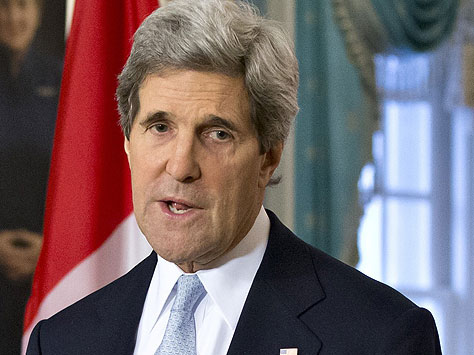The United States and top Gulf Arab ally Saudi Arabia said on Monday that talks between Iran and world powers on a diplomatic solution to its disputed nuclear program could not go on indefinitely.
Israel, Iran's arch-enemy and convinced Tehran is secretly trying to develop nuclear weapons, has grown impatient with the protracted talks and has threatened pre-emptive war against Tehran if it deems diplomacy ultimately futile.
"There is a finite amount of time," Secretary of State John Kerry, in Riyadh on his first overseas trip as Secretary of State, said of the talks between a group of six world powers and Tehran, Saudi Arabia's main regional adversary.
Kerry was speaking at a news conference held jointly with his Saudi counterpart Prince Saud al-Faisal, who suggested Iran was not showing sufficient seriousness about the discussions, which he said "cannot go on forever".
Iran was upbeat last week after talks with the powers in Kazakhstan about its nuclear work ended with an agreement to meet again. But Western officials said it had yet to take concrete steps to ease their fears about its atomic ambitions.
The United States, China, France, Russia, Britain and Germany offered modest sanctions relief in return for Iran curbing its most sensitive nuclear work but made clear that they expected no immediate breakthrough.
Prince Saud suggested that the Iranians did not appear sufficiently committed at the talks in Almaty, Kazakhstan.
"We can't be like philosophers who keep talking - we have to talk seriously and honestly and we have to put in our commitment clearly on the table," he said.
The United States and many of its allies suspect Iran may be using its civil nuclear program as a cover to develop atomic weapons, a possibility that Israel, which is regarded as the Middle East's only nuclear power, sees as a mortal threat.
Iran says its program is solely for peaceful purposes, such as generating electricity and making medical isotopes.
Kerry, in the final stages of a nine-nation, 11-day trip that will also take him to Abu Dhabi and Doha, said he and Saudi al-Faisal discussed their countries' shared determination to prevent Iran from acquiring a nuclear weapon.
"We both prefer - and this is important for Iranians to hear and understand - we both prefer diplomacy as the first choice, the preferred choice," Kerry said.
"But the window for a diplomatic solution simply cannot by definition remain open indefinitely."
Echoing Western concerns about a possible nuclear arms race in the Middle East in the event that Iran obtained a nuclear bombs, Kerry made a series of arguments for Gulf Arab countries not to pursue a military nuclear capability.
These included U.S. policy to prevent Iran from acquiring such arms, the dangers of proliferation, the diversion of resources that could otherwise go to economic development and the general trend by the United States and Russia toward reducing their arsenals.
"The threat is not just the threat of a nuclear bomb, the threat is also the threat of a dirty bomb or of nuclear material being used by terrorists," he said.






